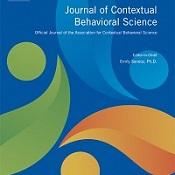
Larsson, A., Hartley, S., & McHugh, L. (2022). A randomised controlled trial of brief web-based acceptance and commitment therapy on the general mental health, depression, anxiety and stress of college students. Journal of Contextual Behavioral Science, 24, 10-17. https://doi.org/10.1016/j.jcbs.2022.02.005
The college years are frequently understood as being a carefree time in a young person's life, however, research suggests that these are formative and challenging times for many. The purpose of the study was to examine the effectiveness of a brief internet intervention based on Acceptance and Commitment Therapy (ACT) for promoting general mental health among college students. As far as can be determined, the impact of an online guided self-help version of (i) contact with the present moment, (ii) cognitive defusion and (iii) self-as-context processes of ACT on mental health has never been tested in a student-based randomized trial. The current study was a randomized controlled wait-list trial consisting of a 3-week intervention and a 3-week follow-up phase. Out of 174 participants, 113 were included in the analysis. Inclusion criteria were: (1) no formal diagnosis of mental health disorders, (2) no previous experience of ACT, mindfulness or mindfulness-based exercises, (3) over 18 years of age, and (4) currently registered as a university or college student. Participants were randomly assigned to an ACT-based intervention (N = 87) or a wait-list control (N = 87). Neither investigators nor participants were blinded to group assignment. The primary outcome measure was general mental health (GHQ-12). Depression, Anxiety and Stress were also measured (DASS-21) as well as psychological flexibility (AAQ-2) at pre- and post-intervention, and 3-week follow-up. The results indicated significant improvements in general mental health in the ACT processes group compared with the wait-list control group (p = .005, d = 0.48) at post treatment but not at follow-up. There were no significant differences between the groups on any other outcome measures. The results from this study provide some support for the effectiveness of a brief web-based ACT intervention to enhance general mental health. However, there were no significant comparative improvements, but trends, for depression, anxiety or stress.
To find the full text version of this article and others (as well as download a full text pdf.), ACBS members can visit the ScienceDirect homepage here.
